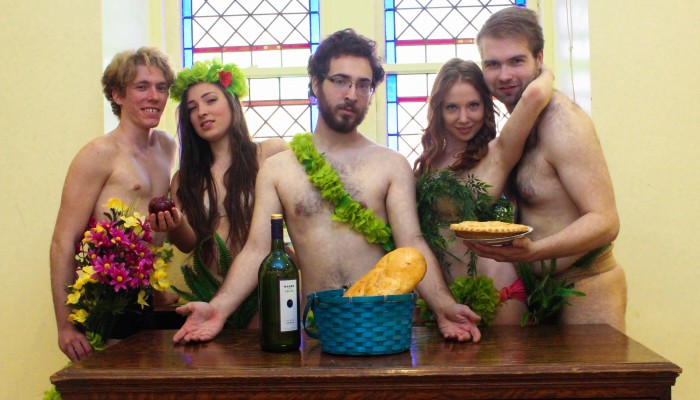Toronto Fringe Q&A: Genesis & Other Stories
Playwright Rosamund Small on religion, theatre and her site-specific play at the Toronto Fringe Festival
Rosamund Small has a lot to be excited about these days. The 22-year-old Toronto playwright is presenting her work Genesis & Other Stories at Trinity St. Paul’s Church (427 Bloor Street West) as part of the Toronto Fringe Festival this month, and she is teaming up with Outside The March for the premiere of another site-specific production—Vitals—opening next spring as part of Theatre Passe Muraille’s 2014 season.
Here, Small gives us a behind-the-scenes peek at the making of Genesis, a “play-within-a-play-within-a-church.” The story follows Christopher, a theology student, leading a misfit cast of amateur actors in a production of his late father’s play: a hyper-sexed version of Adam and Eve set in 1960s USA.
Theatromania: Tell us about Genesis & Other Stories. What inspired this play?
RS: I was thinking a lot about how people dedicate their lives to religion and to the activities of religion, especially reading biblical texts, and how that feels very similar to theatre. Theatre is a ridiculous, insane, amazing and addictive thing to commit your life to and underneath all of the silliness I think most people in theatre feel that they're following a true calling, and reaching out for something sacred. The parallels with religion are so clear, right down to how we follow old scripts and try to interpret them, just as people try to interpret the bible. So the idea of a group of people putting on a religious play made a lot of sense to me, as the joining of the two great faiths that I understand. And both faiths are ripe for comedy because they're full of frustrations and contradictions and fear. A group of people putting on a play that is literally sacred seemed like an amazingly high stakes situation to let crumble. So I thought....farce. Big farce. With people falling down and stuff.
It's a very darkly political piece in a lot of ways, and deals with sexuality and people trying to perform for each other, but I think this play is a great access point to that conversation because it's not about religion being bad or good, I don't know that and I never will. I've met deeply religious people who love the play, and are so kind when they tell me it spoke to them about the misuse of faith for homophobia or misogyny. I've also met a lot of atheists who took something away from it they didn't expect. If the play succeeds, it's about coming together to see how ridiculous we all are.
Theatromania: Has the production changed much since it was originally developed at the Paprika Festival?
RS: Yes. I started drafts of this play years and years ago, from high school, and since then I've developed more of a sympathetic view of the characters in the play. All five of them are ridiculous, and we laugh at them through the show, but I've developed love for them. This isn't really a play about making fun of these young Christians at all, it's about sharing their pain while we laugh at them. It's strange that as I let the characters show their pain onstage, the play became funnier. Even though I think now the audience is rooting for the characters to succeed a little, we're also laughing more as they fail. I guess that's just laughter of recognition. They are human, we are human, and they fail just like we fail.
Theatromania: What are some of the challenges you've experienced during the rehearsal process?
RS: The whole team had to be strict with ourselves about asking for laughs, which is something people talk about in acting but it's also really possible to ham-it-up in the writing. The difference between asking for what the character wants, and asking for what you want (which is to make the audience laugh), is huge. It's everything. The script needed to be fleshed out until there were solid character arcs, while maintaining the beat by beat comedy, and it was really tempting to throw in cheap jokes that didn't really make sense for the environment or the characters. I think me and the actors all struggled with those choices and are continuing to hone that very carefully. The only person in rehearsal who never ever falls into the cheap bits is our director Vivien Endicott-Douglas. She's just amazing, she can pull the funniest scene together you've ever thought of and not a moment of it is contrived, ever. Her choices are always logical, moment-by-moment steps towards an amazingly funny punchline that reveals the character to the audience perfectly. The way she pieces a scene together honestly makes me pee laughing. She anchors the whole show, no sweat.
Theatromania: What excites you most about this year's Toronto Fringe Festival?
RS: Oh I'm SO excited. Bouncing with excitement. Fringe audiences are always ready to fall in love with work, but also they have so many options it's a real challenge to stand out. I hope we do stand out, I believe in the production and the performances and I want everyone to share in what we've done. So I'm excited for the challenge. And I want to meet all sorts of Fringe artists and see everything and be a part of the Festival as a whole. Also being an integral part of the Festival beer drinking matters to me, as an artist.
Theatromania: What's next for you?
RS: I'll be workshopping my new play Vitals over the next few months, getting ready for next May when it's being produced by Outside the March in association with Theatre Passe Muraille. It's a show about a Toronto paramedic so director Mitchell Cushman and I will be doing a lot of exploration and research about ambulances and hospitals and 911 calls. I'm pretty stoked.
Genesis & Other Stories runs from July 3 to 14. Visit fringetoronto.com for show times.







Comments
Post new comment